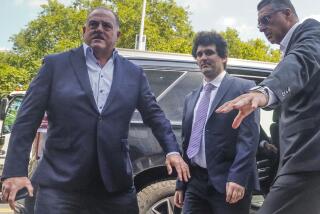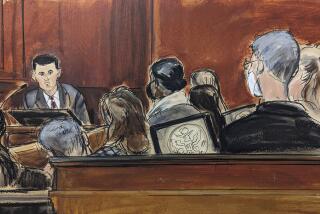Hamdan case goes to the jury
- Share via
GUANTANAMO BAY, CUBA — The war crimes case against Salim Ahmed Hamdan went to the military jury Monday, with defense lawyers urging acquittal to restore the world’s faith in U.S. respect for the rule of law and a prosecutor accusing the defendant of having protected Al Qaeda leaders so they could “kill another day.”
In closing arguments, a defense attorney, Navy Lt. Cmdr. Brian Mizer, made a surprising disclosure, suggesting that Hamdan had offered to help U.S. forces in a significant way but that “we squandered that opportunity.”
Mizer said he was referring to secret testimony given Thursday by Army Special Forces Col. Morgan Banks III, who encountered Hamdan shortly after his Nov. 24, 2001, capture at a roadblock in Afghanistan.
The military judge, Navy Capt. Keith J. Allred, warned Mizer not to stray into classified territory, but the lawyer was allowed to remind jurors to “look at the information Mr. Hamdan provided to the United States when it mattered most.”
“You know what Mr. Hamdan had agreed to do and you know how we squandered that opportunity,” Mizer told the court, stirring speculation that the defendant, who was Osama bin Laden’s driver, might have offered to lead U.S. forces to an Al Qaeda hide-out.
At the time Hamdan was in U.S. custody at Bagram Air Base, north of Kabul, Bin Laden and the Al Qaeda hierarchy were thought to be holed up in the remote mountain area of Tora Bora on the Afghan- Pakistani border.
Prosecutor John Murphy of the Justice Department urged the military jury to disregard defense claims that Hamdan’s cooperation with his captors should have any bearing on their verdict.
Hamdan knew he was working for a terrorist organization and stayed in Bin Laden’s employ despite Al Qaeda’s targeting of U.S. troops and civilians, Murphy said.
The prosecutor detailed allegations that Hamdan delivered weapons to Al Qaeda and Taliban forces, shuttled Bin Laden and other top plotters around their bases and training camps, and was trusted with guns and radios in the Al Qaeda leader’s presence, suggesting he was more than a $200-a-month hired hand.
“The leader of Al Qaeda himself hosted a wedding feast for the accused. This shows just how close he was to the very top of this terrorist conspiracy,” Murphy said.
“This was textbook, classic, model behavior for material support,” the prosecutor said in his hourlong closing, calling on the jury to convict on all 10 counts of conspiracy and material support to terrorism.
Mizer told the jury that Hamdan didn’t even know where Bin Laden was to be driven most of the time, never mind any terrorism plotting.
“Not one witness said he had any role in the terrorist attacks themselves,” Mizer said.
He noted that the government has about 270 prisoners here, including hard-core Al Qaeda warriors, who could have been called to testify against Hamdan but weren’t.
Joseph McMillan, a civilian lawyer representing Hamdan, asked the jury to be guided by “the values that define who we are,” to demonstrate to a skeptical world that U.S. courts respect the rule of law, not concepts like guilt by association.
The two sides also squared off over when the armed conflict between the United States and Al Qaeda began, an important element for the jury to determine because Hamdan can be convicted of war crimes only if those offenses occurred during a state of armed conflict.
The Bush administration deployed troops and authorized them to use deadly force against members of Al Qaeda on Oct. 7, 2001, the first formal retaliation for the Sept. 11 terrorist strikes. That was about the time, according to testimony, that Hamdan parted from Bin Laden to take his family out of Afghanistan to safety.
Government lawyers and witnesses argued that the war with Al Qaeda began much earlier, as evidenced by terrorist strikes against U.S. embassies in Kenya and Tanzania in 1998 and the attack on the destroyer Cole in Yemen in 2000.
In his instructions to jurors, Allred said they could consider for themselves when any armed conflict between the United States and Al Qaeda commenced, based on the length, intensity and duration of armed confrontations; whether and when the U.S. deployed forces; and statements of leaders of both sides.
Allred told the five men and one woman on the jury that they should come to a verdict “according to the law as I’ve given it to you, the evidence introduced at trial and from your own conscience.”
--
More to Read
Sign up for Essential California
The most important California stories and recommendations in your inbox every morning.
You may occasionally receive promotional content from the Los Angeles Times.














